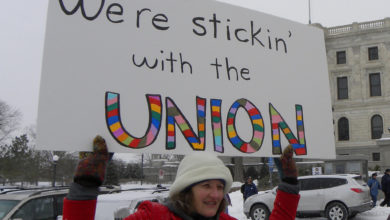In Jackson, Ga., the first death sentence to be carried out in 2015 was on Vietnam War veteran Andrew Brannan. Brannan was convicted and sentenced to death in the 1998 shooting of sheriff’s deputy Kyle Dinkheller, which occurred during a traffic stop. However, the events leading up to the deadly encounter paint a much different story. At the root of the problem lies the story of a mentally ill combat veteran in need of medical treatment; a highly decorated veteran denied basic human rights and left to die by a system that only benefits the rich.
Veterans: sent to die abroad, left to die at home
Brannan volunteered for the army in 1968, and saw extensive combat. On two separate occasions, after his command had been killed in combat, Brannan was forced to take control of his unit. Consequently, he was awarded the Bronze Star and two Army Commendation medals for his valor. Later, he recounted to his psychiatrist that there were numerous situations in which Brannan narrowly survived during his experience in the war. When he returned home in 1971, like tens of thousands of veterans across the country, he developed severe post-traumatic stress disorder that left him incapacitated.
Subsequently, the home Brannan returned to denied him any system from which to transition into civilian life, and as such he ended up struggling to find a job. Denied the basic rights to employment, housing, or quality health care, Brannan struggled to survive until being granted partial disability in 1984. In 1991, Brannan was diagnosed as 100 percent disabled due to PTSD, and in 1996 he was additionally diagnosed with bipolar disorder. On at least two separate occasions he was hospitalized for mental illness.
With barely any income, no access to quality health care or housing, by the time he shot deputy Dinkheller, Brannan was living in a handmade shack in the middle of the woods with no running water or electricity. The shack was built nearly identically to bunkers he experienced in Vietnam, complete with underground tunnels and a watchtower.
Execution of mentally ill people prohibited under international law
Unfortunately, Brannan is far from the exception to the rule when it comes to the execution of mentally ill persons. Evidence suggests Brannan’s execution is in fact the rule. Purple Heart recipient and Vietnam veteran Manuel Babbitt was executed in 1999. After suffering traumatic brain injury and awakening on a truck full of dead bodies in the Vietnam War, he developed severe PTSD. Leonel Herrera, Wayne Robert Felde, Herbert Lee Richardson, and Larry Joe Johnson, all veterans suffering from PTSD, were executed by the government. In fact, in the past five years alone, the Death Penalty Information Center shows that six veterans with PTSD have been executed.
However, in recent years between the rise of unprecedented suicide rates among active-duty service members and the rise of unemployment and homelessness among Iraq and Afghanistan veterans, what is becoming clear is that post-traumatic stress disorder is a highly destructive mental illness. To treat it requires nothing less than full access to quality health care, stable housing and steady income. Considering the fact that the vast majority of soldiers enlist from poor and working neighborhoods, the lack of a social, medical or economic safety net leaves veterans helpless when service members are discharged.
The death penalty: A weapon of the rich
While it is true that Brannan, like many of the other veterans who have been executed, committed acts of violence against others, what becomes clear when put into a broader context of class and race is that these executions have nothing to do with justice and everything to do with systematically murdering poor and working people.
In 2008, Robert H. Richards IV pleaded guilty to the fourth-degree rape of his own three-year-old daughter, effectively avoiding any time in prison and being sentenced to probation. With regards to the sentencing, the judge explained that Richards, the great-grandson of Irenee du Pont, would, “not fare well in prison.” Irenee du Pont was an American capitalist who in the 1930s openly advocated white supremacy, genocide and eugenics. Before his death, in 1963, du Pont was one of the richest Americans in the country.
In fact, alongside the crime of executing disabled veterans in need of medical treatment, the U.S. has a long legacy of using systemic terror, murder and the death penalty as a tool of capitalist white supremacy.
America’s notorious “War on Drugs” implemented a new form of Jim Crow that would create the largest prison-industrial complex in human history, specifically targeting Black and Latino communities. By 1998, when Brannan was convicted and sentenced to death, according to an article published in the Cornell Law Review, there were 1,794 white district attorneys in the U.S. states that allow the death penalty. Yet, there were only 22 Black DAs and 22 Latino DAs. By 2002, 50 percent of all executions in U.S. history were on Black persons.
An injustice to one is an injustice to all!
What is clear is that the murder of Brannan has nothing to do with justice. Executing a mentally ill veteran neither makes our communities safer nor does it get to the root of violence. If poor and working people want safety, security and justice for our communities, we need access to the tools, wealth and institutions of society at our disposal to use for our benefit. We need free access to quality health care, we need jobs that pay more than just enough to survive till the next day of work, we need free access to quality education, and the basic right to a home.
We must see past the surface violence and get to the root of our problem, and that is capitalism. The system of capitalism is one that puts the vast wealth created by society into the hands of private investors, CEOs and a tiny minority of super-rich elites. It is a system that seizes control over hospitals, schools and the factories we work in, and controls them for the sole purpose of profit. Capitalism is the dictatorship of the rich.
We must fight back and demand an end to racist and classist death sentences that are tearing our communities apart. We must unite and fight for socialism, a system that puts people and basic human rights before the profit of the rich. Only through socialism can we take control over the vast wealth we create and use it for the betterment of society before the profit of the rich.






